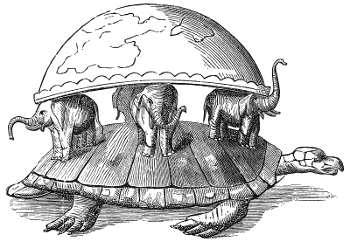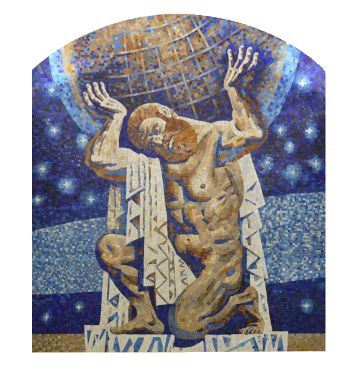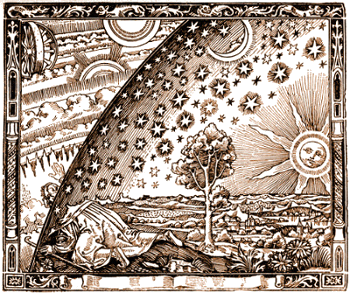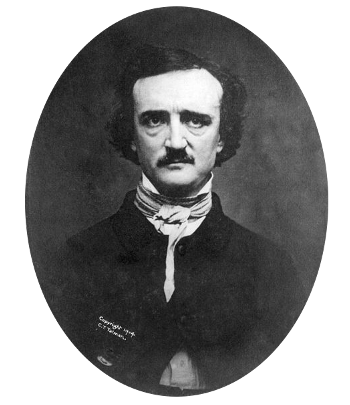The Cosmology of Edgar Allan Poe
July 6, 2015
Our distant
ancestors certainly wondered about the objects in the
night sky; and, over the course of time, the more imaginative of them
conjectured about the
nature of these objects, and the nature of the
world, itself. While they had some rudimentary
observations, such as the
cycle of days and nights, and the shifting position of the
Moon, their
cosmology was of a
speculative sort, more like that of a
philosopher than a
scientist.
Cosmology, from the
Greek kosmos (κοσμος, "world") and logia (λογια, "study of"), is the study of the origin and working of the
universe. While scientists have now overwhelmed this field of study, it was once the sole province of
theologians and philosophers. Some vestige of philosophical cosmology lingers in our scientific world, one example being the
eschatological writings of
Teilhard de Chardin (1881-1955).
One early
model of the universe, devised by the
Babylonians, pictured a flat Earth floating in the "
waters of chaos," with the
dome of heaven protecting Earth from being overwhelmed by these waters. Since
rock doesn't float, the
Hindu's decided that the Earth was carried by a
turtle floating on that vast sea. Since balancing the Earth on a
turtle shell is problematic, there are
elephants who stand on the turtle to carry the Earth (see figure).

The Hindu model of the universe.
(An illustration from Popular Science Monthly, volume 10, 1876, via Wikimedia Commons.)
The
ancient Greeks had their own
mythological conception of how Earth is sited in the universe.
Atlas, one of the
Titans, was the carrier of the Earth (see figure).
Anaxagoras (500-428 BC) had a
physical cosmology involving
atoms coalescing in an
infinite void, which is interesting for both the concept of the atom and the idea of an infinite universe.
Aristotle (384 BC-322 BC) had a more
traditional view of a
geocentric universe having a
spherical Earth surrounded by
concentric celestial spheres that carried the
stars and
planets.

Mosaic of Atlas in a subway station.
(Detail of a photo by K.A. Stepanov, via Wikimedia Commons.)
Aristotle's influence in the
Catholic Church on matters of
science didn't start until 1231, when
Pope Gregory IX gave his permission to theologians to study the writings of this "
pagan."
Aristotelianism allowed a gloss over the
lacuna of the
Bible, so it was embraced by the
intellectuals within the Church. In this way, the Aristotelian conception of geocentricism and the celestial spheres persisted through the
Middle Ages. As can be seen from the history of
Galileo (1564-1642), a strong belief in Aristotelian cosmology persisted to his time.

A medieval pilgrim crossing the sphere of the fixed stars.
A wood engraving from Camille Flammarion's L'Atmosphere: Météorologie Populaire (Paris, 1888), p. 163.
(Via Wikimedia Commons.)
Advances in
observational astronomy in the
20th century have vastly transformed our understanding of the universe. We now know its
age (13.8 billion years) and
extent (93 billion
light years, or 29
gigaparsecs, in
diameter), and we have a basic understanding of its components (
dark matter and
dark energy excepted). However, in the
19th century, there was still cause for speculation, and one such 19th century cosmology was published by
Edgar Allan Poe (1809-1849) in a work entitled, "
Eureka: A Prose Poem."[1] Poe's cosmology is discussed in a recent
arXiv paper by
Paolo Molaro of the
Osservatorio Astronomico di Trieste and
Alberto Cappi of the
Osservatorio Astronomico di Bologna.[2]
Although formally
subtitled a "
prose poem" on its
title page, an alternative subtitle, as presented on the first page of the exposition, is "An Essay on the Material and Spiritual Universe".[1] It's a written
adaptation of an poorly-attended 1848
New York City lecture by Poe entitled, "On The Cosmography of the Universe." Although Poe considered Eureka to be his best work, the lecture and book were poorly received. Scientists, of course, were critical of its unfounded speculation, and others objected to the content for
religious reasons. Some even think it was a product of Poe's declining
mental health during his later years.

Edgar Allan Poe (1809-1849)
This daguerreotype of Poe was taken by Edwin H. Manchester in the same year as Poe's "Eureka" lecture.
(From Michael J. Deas, "The Portraits and Photographs of Edgar Allan Poe," University Press of Virginia, 1988, p. 40, via Wikimedia Commons.)
Poe's Eureka actually
presaged some later
discoveries in scientific cosmology, as I'll discuss.
Maverick scientist and closet Aristotelian,
Arthur Eddington, wasn't as dismissive of Poe's efforts as other scientists, although Eddington, too, knew that Eureka failed the
scientific criteria for being an actual
theory. I wrote about Eddington in a recent article (
Numerology, March 2, 2015). In a September 29, 1940, letter to Poe
biographer,
Arthur H. Quinn, Eddington wrote,
"It is, I think, the work of a man trying to reconcile the science of his time with the more philosophical and spiritual cravings of the mind. Poe, besides being fairly well-informed in science and mathematics, seems to have had the mind of a mathematician, and consequently was not to be put off with vague phrases; and made a creditable attempt to introduce precision of thought... I should say then that regarded as an attempt to put forward a new physical theory, Eureka would rightly be regarded as a crank-theory by scientists of the time. (The trouble with cranks is usually, not that they are not far-seeing, but that they have no appreciation of the immediate obstacles in the road.) Poe's more definite suggestions... were not unintelligent but amateurish."
Alberto Cappi has written previously about Poe's Eureka.[4-5] Cappi and coauthor, Paolo Molaro, write that Poe was the first to imagine a
Newtonian evolving Universe.[2] The fact that the universe is evolving was only established in the early 20th century with
Edwin Hubble's discovery of
universal expansion. Poe reasoned that a static universe would have collapsed upon itself because of
gravity. In Eureka, Poe discussed
Olbers paradox, and the existence of
galaxies other than the
Milky Way. The realization that
nebula are really galaxies did not occur until 1920, more than seventy years after the publication of Eureka.
The
astronomy at the time of Eureka's writing was essentially just
planetary stellar astronomy with some study of the "
nebulae."
John Herschel (1792-1871) and
Friedrich Bessel (1784-1846) were the prominent
astronomers of the early
19th century, and the
planet Neptune was discovered in 1846. There was some evidence of structure in the nebulae, but it was not until the later part of the century that the
spiral structure of
Messier 101, the
Pinwheel Galaxy, was observed and
sketched.
The idea of an infinite universe was philosophically repugnant to Poe since it requires unlimited
matter.[2] Poe uses Olbers paradox, which I wrote about in a
previous article (Stardust, August 20, 2014), to reject the idea of an infinite universe. Poe accepts Herschel's estimate of the size of the universe, about three million light years.[2]
Building on the idea that the universe is finite, Poe writes that the number of stars is less than the number of
atoms in a
cannon ball. A middle-sized cannon ball weighs 18
pounds (about 8
kilogram). Since the
gram molecular weight of
iron is 55.845
grams, a cannon ball contains about 143
moles of atoms, or 8.63 x 10
25 atoms. Our known universe contains about 10
22 stars, an estimate obtained by multiplying its 100 billion galaxies by 100 billion stars per galaxy, so Poe's
inequality still holds true.
Poe
intuitively conjectured the
hierarchical structure of the universe in his appeal to
Newton's gravitation when he writes, "There is nothing to impede the aggregation of various unique masses, at various points of space."[1] Poe imagined the universe to be a spherical cluster of galaxies separated by voids; or, as he termed it, "immeasurable vacancies in space."[1] Poe believed our universe to be
just one of many; viz.,
"There exist a limitless succession of Universes more or less similar to that we have cognizance. Add to this: If such clusters of clusters exist, however -- and they do -- it is abundantly clear that, having had no part in our origin, they have no portion in our laws. They neither attract us, nor we them... Among them and us -- considering all, for the moment, collectively -- there are no influences in common."[1-2]
Before I close, I'll mention one of my favorite
science fiction television series -
Eureka, which ran for many years on the
Syfy network, previously known as the "Sci-Fi Channel." While this
cable network is known for its silly,
made-for-television, science fiction films that notoriously trash all the science, Eureka was well
scripted. There was also good
character development that made it interesting beyond the science.
References:
- Edgar Allan Poe, "Eureka: A Prose Poem," Geo. P. Putnam (New York, 1848), via Project Gutenberg.
- Paolo Molaro and Alberto Cappi, "Edgar Allan Poe: the first man to conceive a Newtonian evolving Universe," arXiv, June 17, 2015.
- Letter of Eddington to Arthur Hobson Quinn about Eureka, from "Edgar Allan Poe: a critical biography," by Arthur Hobson Quinn (Appleton-Century-Crofts, 1941), pp.555-556. Available on Amazon, here.
- Alberto Cappi, "Edgar Allan Poe And His Cosmology," December 1, 2005.
- Cappi, Alberto, "Edgar Allan Poe's Physical Cosmology," Quarterly Journal of the Royal Astronomical Society, vol. 35 (June, 1994), pp. 177-192. The full paper is available as a PDF file at this link.
Permanent Link to this article
Linked Keywords: Ancestor; night sky; conjecture; natural philosophy; Earth; world; observation; diurnal cycle; cycle of days and nights; Moon; cosmology; speculative reason; speculation; philosopher; scientist; Greek language; universe; theology; theologian; eschatology; eschatological; Teilhard de Chardin (1881-1955); conceptual model; Babylonia; Babylonian; chaos; celestial sphere; dome of heaven; rock; Hindu; turtle; turtle shell; elephant; Popular Science Monthly; Wikimedia Commons; ancient Greece; ancient Greeks; mythology; mythological; Atlas; Titan; Anaxagoras (500-428 BC); physical cosmology; atom; coalescence; coalesce; infinity; infinite; vacuum; void; Aristotle (384 BC-322 BC); ancient Greek philosophy; tradition; geocentric model; sphere; spherical; concentric; star; planet; mosaic; metro station; subway station; Catholic Church; science; Pope Gregory IX; paganism; pagan; Aristotelianism; lacuna; Bible; intellectual; Middle Ages; Galileo (1564-1642); medieval; pilgrim; fixed stars; wood engraving; Camille Flammarion; observational astronomy; 20th century; age of the universe; size of the observable universe; light year; gigaparsec; diameter; dark matter; dark energy; 19th century; Edgar Allan Poe (1809-1849); Eureka: A Prose Poem; arXiv; Paolo Molaro; Trieste Astronomical Observatory; Osservatorio Astronomico di Trieste; Alberto Cappi; INAF; Osservatorio Astronomico di Bologna; subtitle; prose poem; title page; literary adaptation; New York City; lecture; religion; religious; mental health; daguerreotype; presage; discovery; maverick; Arthur Stanley Eddington; Arthur Eddington; scientific criteria; theory; biographer; Arthur H. Quinn; spirituality; spiritual; mind; mathematics; mathematician; crank-theory; crank; unintelligent; amateur; amateurish; Newtonian; Edwin Hubble; metric expansion of space; universal expansion; gravitation; gravity; Olbers paradox; galaxy; galaxies; Milky Way; Great Debate astronomy; planetary science; stellar astronomy; nebulae; John Herschel (1792-1871); Friedrich Bessel (1784-1846); astronomer; 19th century; planet; Neptune; spiral; Messier 101; Pinwheel Galaxy; sketch; matter; round shot; cannon ball; pound; kilogram; gram molecular weight; iron; gram; mole; inequality; intuition; intuitive; hierarchy; hierarchical structure; Newton's law of universal gravitation; Newton's gravitation; multiverse; physical law; gravitational attraction; science fiction; TV series Eureka; Syfy network; cable television; cable network; television film; made-for-television; screenplay; script; character development.